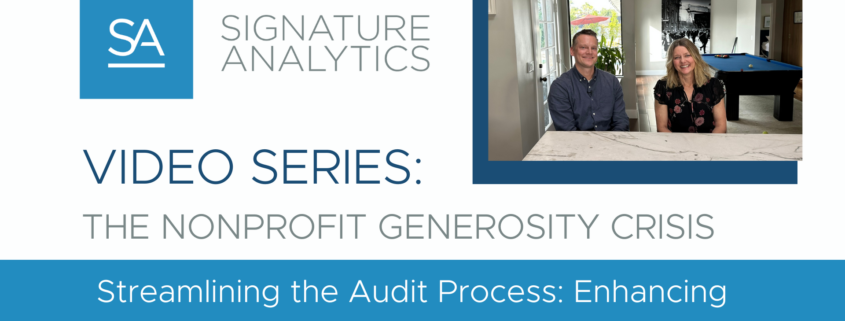Streamlining the Audit Process: Enhancing Nonprofit Financial Systems
In California, nonprofit organizations with as little as $2 million in revenue are mandated to undergo financial statement audits. This relatively low threshold presents a significant challenge for many nonprofits, highlighting a gap between the stringent audit requirements and the available internal financial management capacities of these organizations.
The Digital Audit Dilemma: Case Study
“Effective financial management and digital readiness are not just about compliance; they’re about ensuring your nonprofit can respond with agility and confidence when audit time comes.”
Transitioning to digital audits means moving away from traditional paper-based record-keeping systems to more modern, electronic methods. For many nonprofits, this shift can be challenging, especially if they haven’t adequately prepared for it.
Imagine a nonprofit organization that has been managing its financial records using paper documents for years. When it’s time for their audit, they realize they need to digitize these records to comply with the audit process. However, this transition isn’t as straightforward as they had hoped.
The nonprofit faces various obstacles during this digital transformation. They encounter difficulties in scanning and organizing their paper documents into digital formats. As a result, the audit process gets delayed, causing frustration and added stress for the organization.
Moreover, as they delve into the digital realm, they uncover inefficiencies in their document management system. They realize that their existing processes are not optimized for digital audits, leading to errors, confusion, and ultimately, a less effective audit process.
In essence, this case study illustrates the challenges nonprofits may encounter when transitioning to digital audits. It underscores the importance of being prepared for such changes and emphasizes that effective financial management and digital readiness are essential for nonprofits to navigate audits successfully.
Proactive Financial Management: Key to Audit Success
The cornerstone of a successful audit lies in robust and proactive financial management. Organizations that maintain diligent monthly financial closing and reconciliation practices find themselves better equipped to address the auditors’ requests efficiently. This preparedness can significantly reduce the audit’s impact on the organization’s operations.
Establishing Strong Financial Systems
A comprehensive approach to audit preparation goes beyond basic record-keeping. It requires a deep understanding of financial reconciliation and the ability to produce detailed, accurate financial schedules. Educating the accounting team on these practices is vital to building confidence in the organization’s financial statements.
Embracing Technological Solutions
To navigate the complexities of modern audits, nonprofits must leverage technology. This not only facilitates meeting the digital expectations of auditors but also enhances the organization’s overall financial management processes, making them more streamlined and efficient.
For nonprofits, particularly in California, navigating the audit process with a proactive and technologically adept financial strategy is crucial. By fortifying their financial systems and processes, nonprofits can ensure that they not only comply with audit requirements but also reinforce their financial integrity and operational effectiveness.
How Signature Analytics Can Help Your Nonprofit
Signature Analytics’ nonprofit accounting services help you make financial decisions based on the highest quality accounting practices, while our day-to-day outsourced accounting teams implement the highest quality donor and government accounting standards.
For additional assistance with cash flow management, developing detailed nonprofit budgets, and audit support, contact Signature Analytics today.




